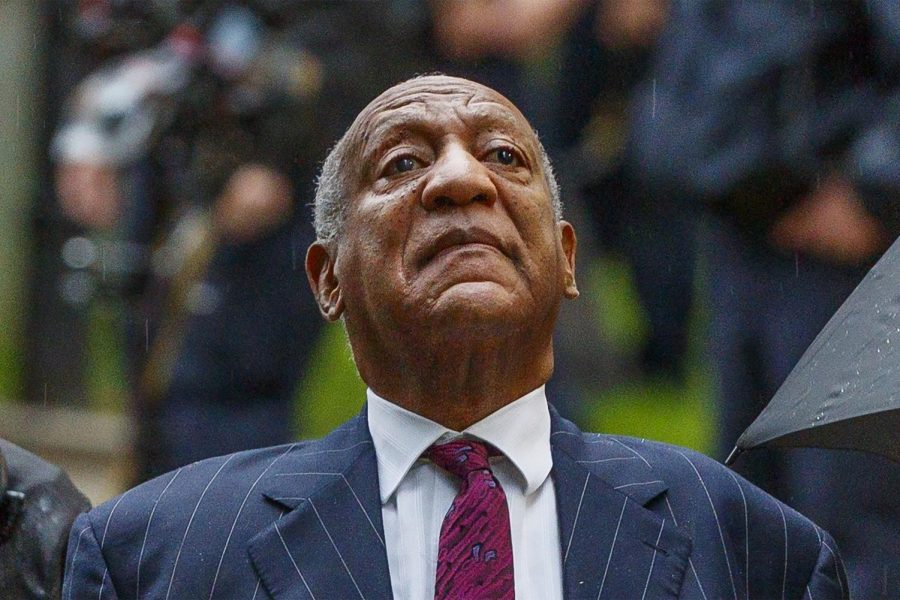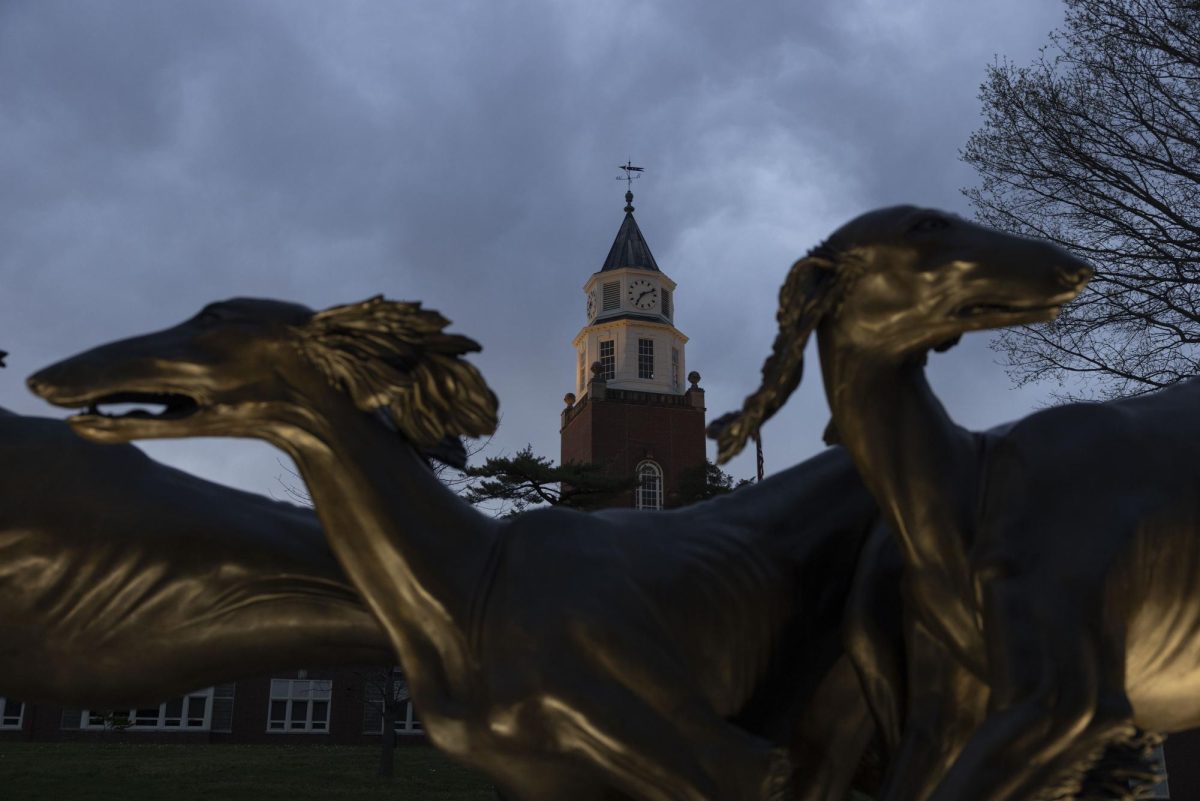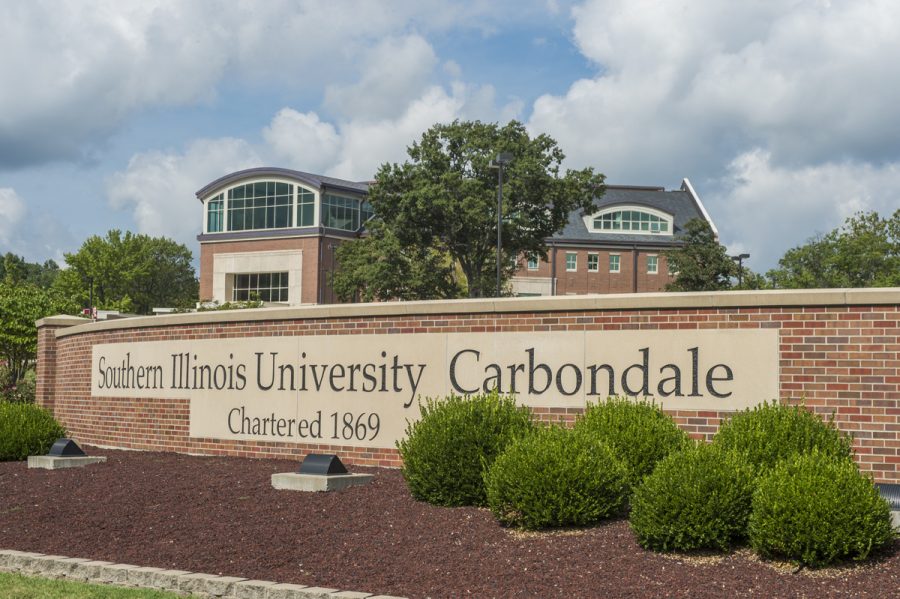Led away in handcuffs, Bill Cosby will serve 3 to 10 years in prison for sex assault
Bill Cosby raises his head toward the sky after a supporter told him to “Pick your head up” as he walks toward the entrance to the Montgomery County Courthouse for the start of the second day of his sentencing hearing on Tuesday, Sept. 25, 2018. (Michael Bryant/Philadelphia Inquirer/TNS)
September 26, 2018
Bill Cosby undid his crimson silk tie, removed the jacket of his navy pinstripe suit and rolled up his sleeves before being handcuffed and led slowly from the courtroom.
“This is it; this is the day,” said Tamara Green, a 70-year-old Cosby accuser who had traveled from San Diego to Pennsylvania to watch the entertainer face justice.
Trembling, she raised her right fist in the air as a sheriff’s deputy escorted Cosby through the courthouse. “It’s just unbelievable and such catharsis, really,” said Victoria Valentino, 75, a former Playboy model who accused Cosby of drugging and raping her in Los Angeles in 1969, as tears trickled down her cheek. “He thought he could get away with it all.”
Advertisement
Completing a spectacular fall from the heights of stardom, Cosby was sentenced Tuesday to three to 10 years in state prison, the first celebrity of the #MeToo era to be locked up.
Rejecting the defense argument that Cosby was too frail to handle time behind bars, Montgomery County Judge Steven O’Neill ordered the 81-year-old entertainer to serve no less than three years and no more than 10 years in prison and to register as a sex offender, a label that will follow him for the rest of his life.
“Mr. Cosby, this all circles back to you,” the judge said as he imposed the sentence. “The day has come. The time has come.”
Cosby, who sat motionless and appeared to show no reaction, declined the opportunity to address the court, waiving his right to have the last word before the sentence was handed down.
The entertainer, who proclaims his innocence and is likely to appeal, never took the witness stand during his two trials and never gave any outward indication of contrition for the crimes he was accused of committing.
Outside the courthouse, a Cosby spokesman seemed to put the blame on his accusers.
“They persecuted Jesus and look what happened,” said his publicist, Andrew Wyatt. “Not saying that Mr. Cosby is Jesus, but we know what this country has done to black men for centuries.”
Advertisement*
The judge denied a request from Cosby’s attorneys that their client remain free on $1 million bail while he pursues an appeal.
Prosecutors had called for Cosby to spend five to 10 years in prison and pay a $25,000 fine, arguing that he is a sexual predator who has shown no remorse. The defense team countered that Cosby, who walks with a cane and is legally blind, should be put under house arrest because he poses no risk to the community and is not self-sufficient.
Though the judge said he recognized Cosby’s age and failing health, those were not the factors he put the most weight on.
“I am not permitted to treat him any differently because of who he is or who he was,” the judge said. “Of course, the higher the ascent, the sharper the fall. I recognize that impact on you, Mr. Cosby, and I am sorry for that.”
Cosby was taken to the Montgomery County Correctional Facility in nearby Eagleville, from where he will be taken to a 3,830-bed state correctional facility called Phoenix. From there, he will be assigned to a state institution in Pennsylvania.
The first major celebrity to go on trial since the #MeToo movement began, Cosby was convicted in April of three counts of aggravated indecent assault for drugging and molesting Andrea Constand, a former university basketball official, at his home in 2004.
Cosby, who has maintained his innocence, initially faced up to 30 years in prison, but on Monday, O’Neill said the defense and prosecution had agreed to merge the three counts of his conviction into one.
More than 50 women have come forward in recent years to accuse Cosby of sexual misconduct, but Constand, 45, is the only woman whose complaint has led to a criminal conviction. Many of the alleged incidents were beyond the statute of limitations, blocking the possibility of criminal charges.
The barrage of accusations against Cosby has shocked and unnerved a nation that grew up watching him on television in the role of a wholesome, exemplary family man.
In the public imagination, he was “America’s Dad,” synonymous with Dr. Heathcliff “Cliff” Huxtable, the kindly, respectable, upper-middle-class obstetrician he portrayed on “The Cosby Show,” his popular and groundbreaking television sitcom that aired from 1984 until 1992.
The sentencing wraps up a long back-and-forth between Cosby and Constand. The onetime basketball official at Cosby’s alma mater, Temple University, first reported an assault to police in 2005. However, the Montgomery County district attorney at the time did not press charges, so she brought a civil suit against Cosby. It was not until a decade later, when a series of women came forward with accusations against Cosby, that the new district attorney, Kevin Steele, reopened the case and filed charges in state court.
In 2017, the first trial ended with a hung jury.
In the April retrial, a jury of seven men and five women found Cosby guilty of assault with lack of consent, penetration while the victim was unconscious, and assault after impairing the victim with an intoxicant.
Cosby, who posted $1 million bail, had been confined to his home outside Philadelphia during the last five months, fitted with a GPS monitor and limited to travel only to visit his attorneys or for medical reasons.
Before the judge classified Cosby as a sexual predator, a final defense witness, psychologist Timothy Foley, said the actor did not present a significant risk to the community. “He’s extraordinarily low risk,” Foley said, noting that recidivism in sexual assault cases declines as a product of age and Cosby had no known instances of sexual misconduct over the last 14 years.
On Monday, a psychologist testifying for the prosecution said Cosby had used his “power and prestige” to meet and befriend women, whom he then drugged and assaulted. She said he remained a risk to the community and that it was likely he could offend again.
In a written victim impact statement given to the court, Constand reflected on her role in being the lone women to take on Cosby in criminal court.
“I have often asked myself why the burden of being the sole witness in two criminal trials had to fall to me. The pressure was _ enormous. I knew that how my testimony was perceived _ that how I was perceived _ would have an impact on every member of the jury and on the future mental and emotional well-being of every sexual assault victim who came before me,” Constand wrote. “But I had to testify. It was the right thing to do, and I wanted to do the right thing, even if it was the most difficult thing I’ve ever done. When the first trial ended in a mistrial, I didn’t hesitate to step up again.”
(c)2018 Los Angeles Times
Visit the Los Angeles Times at www.latimes.com
Distributed by Tribune Content Agency, LLC.
Advertisement









